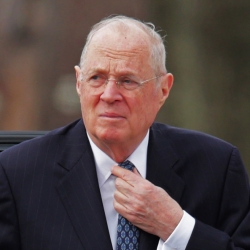
Perennial swing vote Justice Anthony Kennedy said the PASPA law seemed like impermissible commandeering to him.
With Gov. Chris Christie watching from the front row of the courtroom, New Jersey’s lawyer Ted Olson debated with U.S. Supreme Court justices that the PASPA federal ban on sports betting should be repealed.
Several SCOTUS justices gave hints they agreed with New Jersey’s interpretation of sports betting law, causing legal experts to speculate that PASPA might be struck down by the Supreme Court.
A decision on the Professional and Amateur Sports Protection Act is expected by June 2018. Until the decision is rendered, followers of US gambling law can only speculate what Monday’s Supreme Court hearing means.
Justice Anthony Kennedy told Paul Clement, who argued on behalf of the major sports leagues (the plaintiffs in Christie v. NCAA), that the PASPA law seems like impermissible “commandeering” to him. The federal government is not allowed to compel states to do its bidding under the anti-commandeering clause of the US Constitution, so Justice Kennedy appears to be on the side of New Jersey.
Neil Gorsuch Lectures Ted Olson
Justice Neil Gorsuch told Ted Olson that the Supreme Court usually stops short of interpreting statutes in a way that tackles constitutional questions, if possible. Ted Olson has argued before the Supreme Court 63 times now and won over 75% of those cases, so the newly-appointed Gorsuch might have spared the former US Solicitor General the lecture on the court’s procedures.
The exchange did highlight that Justice Gorsuch appeared sympathetic to New Jersey’s state’s rights argument, even if he was looking for ways to back the states without striking down a law passed by the US Congress and allowed to stand for a generation.
Sotomayor and Kagan Support PASPA
Meanwhile, Justices Sonia Sotomayor and Elena Kagan seemed to suggest that PASPA was permissible under their interpretation of the law. Sotomayor and Kagan are two of the more liberal justices on the court, so they could be expected to favor federal authority over state’s rights on many issues.
If the Supreme Court decision comes down to ideological stances on equal footing and state’s rights, then the court might side with New Jersey. Roughly 80% of the time, the Supreme Court opts to overturn appeals that it sees. If it does not see merit in a case, then the nine justices simply reject a hearing. So much of the time over the past generation, Justice Kennedy has held the decisive vote, which is one reason his words with Paul Clement on Monday were so auspicious for Chris Christie and his case against the PASPA law.
How PASPA’s Federal Ban Works
The PASPA law bans sports betting in 46 states, while allowing Nevada to have legal sportsbooks and 3 other states to conduct sports lotteries. One California research firm estimated, if PASPA were struck down, 32 states would legalize sports betting over the next 5 years. Thus, New Jersey’s win could be a win for dozens of US states — and sports bettors across the country.
Americans bet about $5 billion legally on sports every year, mostly through Las Vegas sportsbooks. The American Gaming Association estimates that Americans bet $150 billion illegally on sporting events each year. Much of that betting is through unlicensed offshore online sportsbooks, though significant amounts still are wagered through local bookmakers or bookies.
If the federal ban were lifted, much of that money would be wagered legally through licensed brick-and-mortar sportsbooks. US states would license and regulate operators, then collect tax revenues on the sportsbooks’ profits. Responsible gambling measures, problem gambling helplines and resources, and consumer protections would be in place. Much of the illegal activity would be undermined, which would hurt organized crimes and offshore operators.
1992 Passage of PASPA
The PASPA law was passed by the US Congress in 1992 and signed into law by President George H.W. Bush. The US sports leagues, led by Major League Baseball and the NFL, pushed for Congress to pass the law. Due to lobbying efforts by Nevada, Montana, Delaware, and Oregon, those four states’ pro-sports betting laws were grandfathered into the PAPSA.
To make matters fair for the other 46 states, they were given 1 calendar year to pass their own sports betting laws to legalize sportsbooks. None of the states passed such a law, though New Jersey lawmakers had the votes to do so, had its State Senate president allowed such a vote. That decision would haunt Atlantic City casinos down through the years, especially when casino proliferation, market fragmentation, and market saturation hurt AC casinos. From $5.4 billion in revenues generated in 2006, Atlantic City casinos had roughly $2 billion in revenues last year.
2012 New Jersey Sports Betting Legalization
Gov. Chris Christie led an effort to legalize sports betting to boost the Atlantic City casinos in 2012. A statewide referendum was passed to allow sports betting. When Christie’s government moved to impliment that law, the American sports associations — the NFL, NBA, MLB, NHL, and NCAA — sued New Jersey.
2014 Monmouth Park Sportsbook
After two losses in court and a rejection to hear an appeal by the US Supreme Court, New Jersey’s lawmakers repealed the 2012 laws in 2014. Instead, they decided to look the other way while Monmouth Park and William Hill USA opened a sportsbook. Under Christie’s lawyers’ thinking, if New Jersey did not try to regulate sports betting, the federal government could not compel state officials to enforce the federal ban.
Whether Christie’s lawyers are correct or not will be decided in the coming months. New Jersey hired one of the best lawyers of this generation in Ted Olson, who has made a specialty of arguing before the Supreme Court. The decision is in the hands of the 9 Supreme Court justices now.
